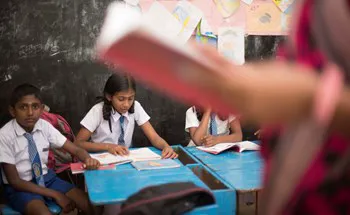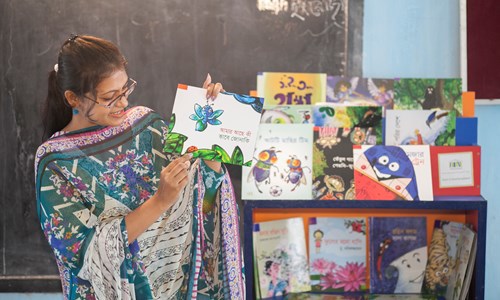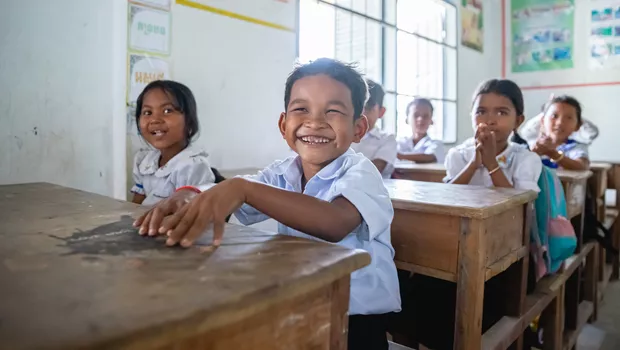 Give a Year of Reading
Give a Year of Reading
For more than a decade, Room to Read has been implementing its Literacy Program in government schools. Often, these schools are in low-resource communities and benefit children who need these interventions the most. Poor quality of education leads to poor reading outcomes. This impacts not only the learning of languages but other subjects as well, and so ultimately pushes children out of the education system.
Room to Read’s Literacy Program develops the skill and habit of reading amongst children in the early grades of school. And we have seen, time and again, the value of partnering with governments in this endeavor. This has not been an easy journey. We spend time working with a set of government officials, only to see them get transferred a few months later, and finding ourselves ‘back to square one.’ At the same time, when we are able to work with government personnel who are committed to building literacy amongst children, the impact has been far-reaching. Room to Read has been able to leverage its technical expertise within existing government structures to create impact across a sizeable global geography and enhance reading outcomes in children around the world.
Here are a few reasons why Room to Read prioritizes partnership with governments:

1. Government schools cater to the most marginalized and deprived groups of children and communities and it is Room to Read’s mission to work with these children.
In many low-income countries, especially in South Asia, there is rampant privatization of education. All kinds of private schools, from elite to low-budget private schools, are mushrooming across urban and rural areas. There is a common perception amongst parents that these schools provide a better quality of education than government schools. If affordability is not a constraint, parents prefer to enroll their children in private schools. As a consequence, the vast majority of children attending government schools are those whose families cannot afford even low-cost private schools and belong to the poorest segment of the low-income communities that Room to Read serves.
These are the children and communities who need a comprehensive literacy intervention the most. They are also the most likely to benefit from it, especially due to the absence of print-rich environments at home, being first-generation learners, and a lack of support at home to enhance their literacy development.
2. The ripple effect of working with the governments maximizes impact.
Over the years, Room to Read’s approach of working with the government was through demonstrating our literacy approach and results in government schools, working directly with government teachers and students. However, we don’t want to stop at demonstrating a good model in a select number of schools. We want to continue to scale up and widen our impact by collaborating with the government and scaffolding the process of integrating some components of our literacy program into government systems.
Why would we want to invest our resources in such an intensive and time-consuming process? Because one small change in government policy can potentially impact millions of children. One early grade reading program that’s launched by the government can lead to enhanced children’s learning at the national level.

3. It is sustainable.
Irrespective of the number of our projects, there are only a limited number of children and teachers that Room to Read can reach directly. And while it is easy to see the impact of our work during the life of the project, we’re asking ourselves: What would we want to see in a government school five years after our project ends? Will teachers be practicing some of the components they learnt during Room to Read trainings, or will they have gone back to the approach they were practicing earlier? Will children still have access to high-quality reading materials and storybooks?
This is why investing in government systems is critical. Once teachers understand the rationale of an approach and internalize a teaching practice, they can continue it for long after the project is over. Once teachers, communities and governments understand the power of good books for young children, they find ways to make them accessible to children. Once the government introduces policy changes, there are supportive structures for continued improvement in the way literacy is taught. These kinds of changes benefit multiple cohorts of children year after year.
There is increasing global recognition of the importance of literacy, and this is a critical time to strengthen government systems to benefit children with greater efficiency and impact.



